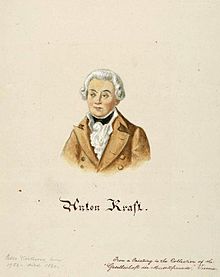
Antonín Kraft (30 December 1749, Rokycany – 28 August 1820, Vienna) was a Czech cellist and composer. He was a close friend of Haydn, Mozart, and Beethoven. He worked in the Holy Roman Empire and later in the Austrian Empire.
Biography
Kraft was born in the Bohemian town of Rokycany of a German Bohemian ethnic family which had assimilated into Czech. He received early musical education on the cello from his father before going to university in Vienna to study law. He soon obtained a position in the Imperial Hofkapelle. In 1778 he was appointed cellist in Prince Nikolaus Esterházy's orchestra, where he met and studied composition with Haydn. In 1783 Haydn wrote his second cello concerto in D (Hob. VIIb/2, Op. 101) for Kraft. In 1789, he met Mozart in Dresden and took part in the premiere of his divertimento for string trio in E-Flat. Mozart played the viola part and Anton Teyber played the violin part. After Esterházy died in 1790, his successor, Prince Anton Esterházy, dismissed most of the court orchestra. Kraft went to Vienna and became a founding member of the Schuppanzigh Quartet, where he helped establish the traditions of string quartet playing. He played in the Grassalkovich court and from 1796 was employed in the orchestra of Prince Joseph Franz von Lobkowitz. He died on 28 August 1820 in Vienna.
Kraft was considered one of the greatest cellists of his time and both Haydn's Cello Concerto No. 2 in D, the cello part in Mozart’s divertimento for string trio in E-Flat and the cello part in Beethoven's Triple Concerto were written for him, though his son Nikolaus Kraft is also claimed to have played the premiere of the latter.
As a composer, he wrote cello sonatas (six for cello with bass published as Op. 1 and 2) and a cello concerto (Op. 4). He also wrote various duos: for violin and cello (Op. 3), for cello and double bass and for two cellos (Op. 5 and 6).
Works
- Op.1: 3 Cello Sonatas in C, G, D
- Op.2: 3 Cello Sonatas in B♭, G, C
- Op.3: 3 Grand Duos for Violin and Cello
- Op.4: Cello Concerto in C major
- Op.5: Cello Duo in G minor
- Op.6: Cello Duo in D major
- Op.7: Cello Duet on the theme from Mozart's Opera The Magic Flute ('Duettino Tamina and Papageno')
- Duets for Cello and Guitar
- Cello Concerto in C major "Seydel's Concerto"
References
- Michael Lorenz: "Anton Kraft's Date of Birth (And his Wine Consumption)" (Vienna 2014)
- Wiener Zeitung, 1 September 1820, p.799
External links
- Free scores by Antonín Kraft at the International Music Score Library Project (IMSLP)
- Werke von und über Antonín Kraft in the German National Library catalogue
This article about a composer is a stub. You can help Misplaced Pages by expanding it. |
- 1749 births
- 1820 deaths
- 18th-century musicians from Bohemia
- 19th-century Czech musicians
- Composers from the Austrian Empire
- 18th-century composers from the Holy Roman Empire
- 18th-century classical musicians
- 19th-century classical musicians
- 18th-century classical composers
- 18th-century male musicians
- 19th-century classical composers
- Austrian Classical-period composers
- Czech classical composers
- Czech male classical composers
- Czech classical cellists
- Esterházy family
- People from Rokycany
- Pupils of Joseph Haydn
- 19th-century Czech male musicians
- Composer stubs